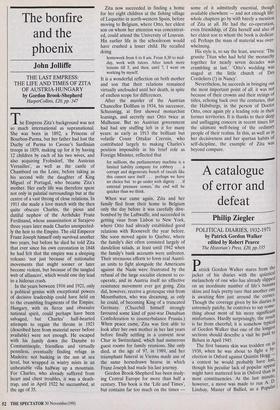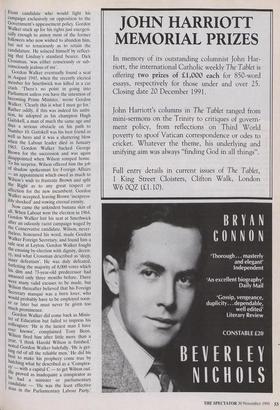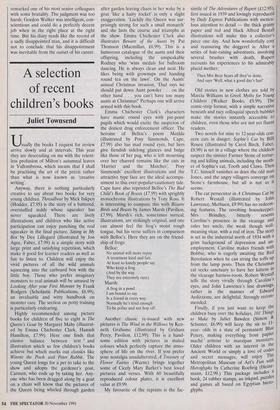A catalogue of error and defeat
Philip Ziegler
POLITICAL DIARIES, 1932-1971 by Patrick Gordon Walker edited by Robert Pearce The Historian's Press, £20, pp.335 ..0 Patrick Gordon Walker stares from the jacket of his diaries with the quizzical melancholy of one who has already slipped on an inordinate number of life's banana skins and feeIs pretty sure that another one is awaiting him just around the corner. Though the coverage given by his diaries is extremely patchy, he contrives to say some- thing about most of his more significant misfortunes. Hardly surprisingly, the result is far from cheerful; it is somehow typical of Gordon Walker that one of the longest sections should describe a visit he paid to
Belsen in April 1945. ...,
The first banana skin was trodden on in 1938, when he was about to fight a bYe election in Oxford against Quintin Hogg' a contest he would probably have lost: though his peculiar lack of popular appeal might have mattered less in Oxford than in most constituencies. At the last minute, however, a move was made to run A. Lindsay, Master of Balliol, as a Popular
Front candidate who would fight his campaign exclusively on opposition to the Government's appeasement policy. Gordon Walker stuck up for his rights just energeti- cally enough to annoy most of the former followers who now wished to abandon him, but not so tenaciously as to retain the candidature. He solaced himself by reflect- ing that Lindsay's standard bearer, Dick Crossman, was either consciously or sub- consciously jealous of me'.
Gordon Walker eventually found a seat in August 1945, when the recently elected member for Smethwick was killed in a car crash. 'There's no point in going into Parliament unless you have the intention of becoming Prime Minister,' wrote Gordon Walker. 'Clearly this is what I must go for.' Rather oddly, if this was indeed his ambi- tion, he adopted as his champion Hugh Gaitskell, a man of much the same age and thus a serious obstacle on his path to Number 10. Gaitskell was his best friend as well as hero and it was a shattering blow When the Labour leader died in January 1963. Gordon Walker backed George Brown for the succession and was again disappointed when Wilson romped home. To his surprise, Wilson offered him the job of shadow spokesman for Foreign Affairs — an appointment which owed as much to Wilson's wish to frustrate Brown and split the Right as to any great respect or affection for the new incumbent. Gordon Walker accepted, leaving Brown 'inexpress- ibly shocked' and vowing eternal enmity. Now came the unkindest banana skin of all. When Labour won the election in 1964, Gordon Walker lost his seat at Smethwick after an odiously racist campaign waged by the Conservative candidate. Wilson, never- theless, honoured his word, made Gordon Walker Foreign Secretary, and found him a safe seat at Leyton. Gordon Walker fought the ensuing by-election with dignity, decen- cY, and what Crossman described as 'deep, inner defeatism'. He was duly defeated, forfeiting the majority of 8,000 votes which his dim and 73-year-old predecessor had amassed only three months before. There were many valid excuses to be made, but Wilson thereafter believed that his Foreign Secretary manqué was a born loser, who Would probably have to be employed soon- er or later but must never be given too much prominence. Gordon Walker did come back as Minis- ter of Education but failed to impress his colleagues: 'He is the laziest man I have ever known', complained Tony Benn. Wilson fired him after little more than a Year. 'I think Harold Wilson is finished, noted Gordon Walker balefully. 'He is get- ting rid of all the reliable men.' He did his nest to make his prophecy come true by hatching what he described as a 'Conspira-
;y' with a capital C — to get Wilson out.
he with
as inadequate a conspirator as
Ile had a minister or parliamentary candidate — 'He was the least effective 'Ilan in the Parliamentary Labour Party,'
remarked one of his most senior colleagues with some brutality. The judgment was too harsh; Gordon Walker was intelligent, con- scientious and could do a perfectly decent job when in the right place at the right time. But his diary reads like the record of a sadly disappointed man, and it is difficult not to conclude that his disappointment was inevitable from the outset of his career.












































































 Previous page
Previous page